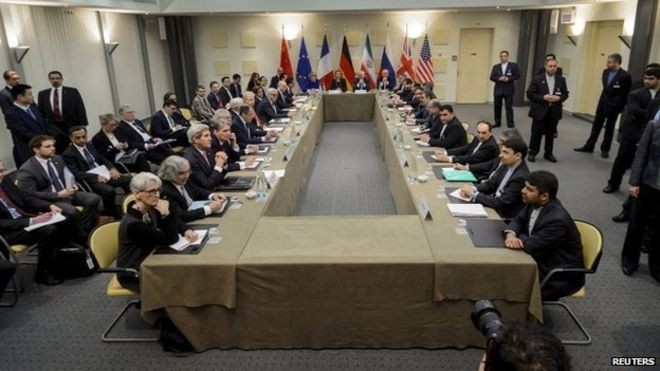(VOVworld) – March 31 is the deadline for the West and Iran to reach a framework agreement on Iran’s nuclear program. Negotiators from the P5+1 (the US, UK, France, Russia, China, and Germany) and Iran have made remarkable progress and are making a final push for a framework agreement.

Foreign ministers from six world powers are meeting their Iranian counterpart in Switzerland
|
If the negotiation in Switzerland succeeds, the parties will sign a framework agreement, paving the way for a 90-day negotiation of a comprehensive agreement.
Breaking obstructions
The negotiators have come a long way since they signed a preliminary agreement in Geneva last November but have not reached their goal. The talks have bogged down on the level of restrictions on uranium enrichment, the removal of nuclear materials from Iran, and the schedule of easing economic sanctions on Iran.
One day prior to Tuesday’s deadline, the negotiators are still engaged in very intensive discussions. US Secretary of State John Kerry cancelled a trip to Boston to attend the nuclear talks in Switzerland. Western negotiators are still optimistic about an agreement with Iran. Iran’s chief negotiator, Abbas Araqchi, told the press that he believes a deal is possible and only two or three issues remain to be resolved.
Pressure and obstacles
US President Barack Obama has faced challenges to the negotiations by the Republican-dominated US Congress. US Senators and congressmen sent an open letter to the White House requesting a stiffer stance in any deal with Iran and pre-approval by Congress. A group of Republic senators signed an open letter to Iran suggesting any deal might last only as long as Obama's presidency.
Iran’s conservative party has tried to hamper President Hassan Rouhani’s negotiations with the world powers. Iran’s parliament, dominated by conservatives, has made the impossible demand that the West lift all sanctions once an agreement is reached.
No retreat opportunity
Despite the obstacles some analysts think there is a chance to reach an agreement. Both sides are feeling a pressure to conclude a framework agreement before the deadline that will benefit all parties, an agreement that will allow Iran to conduct a civilian nuclear program that meets the UN criteria of non-proliferation of nuclear weapons and allow the West to gradually lift economic sanctions which have hurt the West as well as the people of Iran. Western investors have been unable to enter Iran’s natural resources and oil market. An agreement would ease tensions between the US and Iran and could open a new era of cooperation with the Muslim world. Iran’s backing would be an advantage for the US and its allies in the fight against IS.
The result of the negotiation could affect the US Presidential election late next year and boost or damage US influence in the Middle East and the world. Iran wants to grasp this opportunity for global integration and development. The US and the West don’t want to see a failed negotiation which might lead to a nuclear arms race in the Middle East.